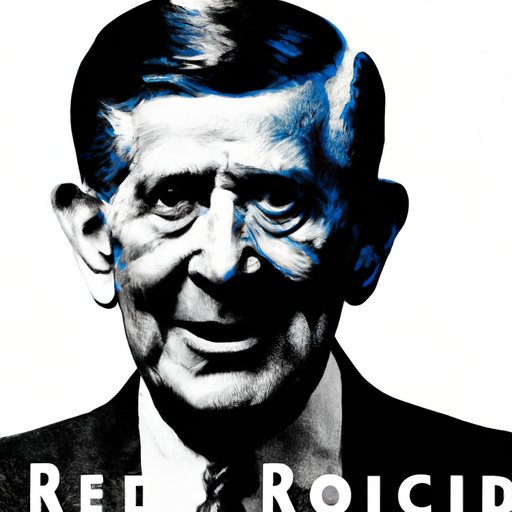Introduction
Ronald Reagan was the 40th President of the United States, serving two terms from 1981 to 1989. His presidency was marked by a focus on domestic policy, including tax reform and economic growth, as well as foreign policy, such as challenging the Soviet Union’s military power and ending the Cold War. Reagan was an effective leader who was able to inspire others, make tough decisions, and bring about positive change. In this article, we will explore how Ronald Reagan was a good leader.
Analyzing Reagan’s Leadership Style
Reagan was known for his strong communication and negotiation skills. He believed in the power of dialogue and believed that it was essential for successful leadership. As he once said, “The greatest leader is not necessarily the one who does the greatest things. He is the one that gets the people to do the greatest things.” Reagan was also an excellent public speaker who was able to effectively communicate his ideas and motivate others to action. He was often praised for his ability to inspire those around him.
Reagan was also known for his focus on optimism and positive results. He was never one to shy away from difficult tasks or obstacles, but instead looked at them as opportunities to succeed. As he famously said, “There are no easy answers, but there are simple answers. We must have the courage to do what we know is morally right.” Reagan was also a firm believer in compromise and believed that it was essential for achieving success. He was willing to work with both sides of the aisle in order to get things done.
Examining Reagan’s Impact on Domestic and Foreign Policy
During his time as president, Reagan implemented several major domestic policies, most notably his economic plan, known as “Reaganomics.” This plan focused on reducing government spending and taxes, while increasing military spending. Reagan also enacted tax reform, which included reducing the top marginal income tax rate from 70% to 28%. He also reduced the corporate income tax rate from 48% to 34%.
In addition to domestic policy, Reagan also had a significant impact on foreign policy. He developed the “Peace Through Strength” doctrine, which aimed to challenge the Soviet Union’s military power and ultimately end the Cold War. Reagan also promoted free trade, believing that it would create a more peaceful world. He also negotiated arms reduction treaties with the Soviet Union, which helped to reduce the risk of nuclear war.
Exploring Reagan’s Record on the Economy
Reagan’s economic policies had a major impact on the US economy during his time in office. Under his administration, the economy experienced steady growth, with the Gross Domestic Product (GDP) increasing by an average of 3.5% per year. Reagan also lowered taxes and increased government spending, resulting in an increase in government revenue. This led to a decrease in the federal budget deficit. Additionally, unemployment decreased from 7.2% in 1981 to 5.5% in 1989.
Assessing Reagan’s Legacy as a Communicator
Reagan was also known for his exceptional public speaking skills. His speeches were often seen as inspirational and motivating, and he was able to effectively communicate his ideas to the American people. Reagan was also one of the first presidents to utilize television to reach a larger audience. He was able to use the medium to spread his message and connect with citizens across the country. Finally, Reagan was able to use his rhetoric and policies to develop the “Reagan Revolution,” which changed the course of American history.
An Overview of Reagan’s Achievements
Reagan’s presidency was marked by several major accomplishments. He was able to successfully challenge the Soviet Union’s military power and end the Cold War. He also promoted free trade and negotiated arms reduction treaties with the Soviet Union. Additionally, Reagan was able to implement tax reforms and economic policies that resulted in economic growth and decreased unemployment.
Analyzing Reagan’s Decision-Making Process
Reagan was known for his strategic thinking and consultative approach to decision-making. He was always willing to listen to the advice of his advisors and take their opinions into consideration. He was also adept at finding a balance between compromise and firmness. Reagan was not afraid to take a stand when necessary, but he was also willing to negotiate and find common ground when possible.
Evaluating Reagan’s Place in History
Reagan’s legacy remains relevant today. He is remembered as one of the most effective presidents in US history and is often compared to other great leaders such as Franklin D. Roosevelt and John F. Kennedy. Reagan’s policies and rhetoric had a lasting impact on modern politics and continue to shape the way we view the world. His legacy is one of optimism, strength, and perseverance.
Conclusion
Ronald Reagan was an effective leader who was able to inspire others, make tough decisions, and bring about positive change. He was an excellent communicator and negotiator who was able to effectively convey his message to the American people. Reagan was also able to implement policies that resulted in economic growth and decreased unemployment. Finally, he was able to challenge the Soviet Union’s military power and end the Cold War. Reagan’s legacy remains relevant today and his example of leadership continues to be a source of inspiration for many.
(Note: Is this article not meeting your expectations? Do you have knowledge or insights to share? Unlock new opportunities and expand your reach by joining our authors team. Click Registration to join us and share your expertise with our readers.)
